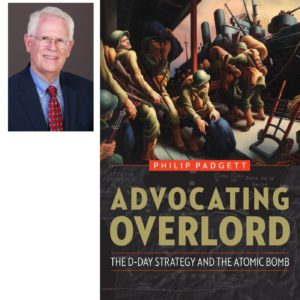Podcast: Play in new window | Download
Subscribe: RSS

Phil Padgett has worked as a political scientist in the field of security studies for much of his career. He turned his skills to writing a book on the WWII Operation Overlord, the atomic bomb, and the relationship between the US and UK during the war.
2:21 – Phil Padgett is a political scientist and has long been fascinated by a meeting between Churchill and Roosevelt during WWII.
4:30 – Phil found a letter by a Naval officer who said big things were being discussed by Roosevelt on a small boat on a lake in Canada during WWII.
6:15 – The book goes over Overlord more than on the discussions for cooperation between the US and UK on the Manhattan Project.
8:10 – The crux of the book is about the UK and the US reestablishing trust during the war.
10:00 – The US Joint Chiefs of Staff had to deal with many military leaders turning against Overlord in favor of a Mediterranean strategy.
12:45 – The US wanted a quick war and a quick strike in order to then move against Japan.
14:48 – Phil talks about the secrecy and knowledge of all parties about atomic bomb research.
19:53 – Both the US and UK knew the atomic bomb was a very powerful weapon and both were concerned about who would control atomic bombs after the war. Nations also felt that strategic bombing could have strong political effect on warring nations.
22:42 – Churchill liked to feed information to Roosevelt before the US joined the war that British bombing was having an effect on Germany.
23:55 – Canada is involved heavily in Overlord. General thinking about the[n] war was that a major amphibious assault would not work.
29:49 – His quid pro quo idea is very controversial. He used primary records at the US National Archives and at the British National Archives.
31:54 – Phil found one of Churchill’s papers with a scorch mark from a cigar burn and it brought him to the moment when history was happening. He also enjoyed going to the war rooms, Hyde Park and being on the battleship Texas.
34:45 – Phil was surprised by the amount that WWI influenced WWII. Especially with air power and a fear of repeating trench warfare.
36:16 – There didn’t seem to be a contingency plan if D-Day didn’t go well. If it failed, they probably would only have been able to conduct a Mediterranean operation afterwards. In late 1943, there was a US threat of a railroad strike over wages and hours. If it occurred, D-Day would have been delayed six months.
39:33 – Roosevelt was pretty much his own Secretary of State on these issues. The Secretary of State ran day-to-day diplomatic operations.
43:33 – Transcripts of the phone calls between Churchill and Roosevelt would be useful to historians. The Germans had cracked the allied system from 1940 to 1943 and kept transcripts of the calls. The records were kept in Berlin and appear to have been destroyed during the bombing of Berlin.
46:42 – Phil is happy he’s started the conversation about the quid pro quo idea.
48:44 – Phil has a website at www.philpadgett.com for the book. The website also has answers to frequently asked questions plus it has more photos.
Links
For more “Military History Inside Out” please follow me on Facebook at warscholar, on twitter at Warscholar, on youtube at warscholar1945 and on Instagram @crisalvarezswarscholar
Guests: Phil Padgett
Host: Cris Alvarez
Tags: military, history, military history, conflict, war, interview, non-fiction book, WWII, world war 2, D-Day, Normandy, Churchill, Roosevelt, Stalin, US, UK, Soviet Union, Berlin, scientists, Joint Chiefs of Staff, war plans
